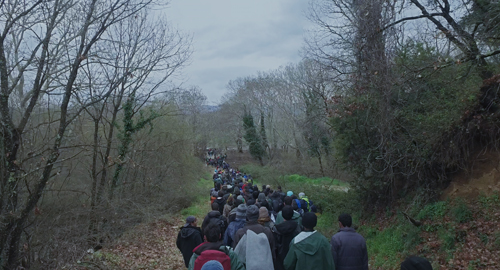
DAVID ADAMS watches ‘Human Flow’, artist Ai Weiwei’s impacting documentary on the world’s forced migration crisis…
Human Flow (AU – M/UK – 12/US – PG-13)
In a Word: Heart-breaking

“Beautifully shot and backed with a stirring, yet understated, soundtrack, this is a deeply impacting film, a stark revelation of the human faces behind the data. For those who only glimpse an occasional insight to the issue via the nightly TV news, this is a deeper look at some of the complexities involved. And, as anyone watching this can see, there are no easy or simple answers.”
The world is facing an unprecedented crisis when it comes to the mass movement of people, largely due to man-made crisis including conflict. When Human Flow was made, more than 65 million people had been forcibly displaced from their homes – that figure has since grown to more than 68 million.
Human Flow, directed and co-produced by internationally renowned artist Ai Weiwei and first released in 2017, is an attempt to show some of the human faces behind the crisis. In scenes captured over a year, we are taken to refugee camps in Iraq and Turkey, the chaos on the beaches of the Greek Island of Lesbos as fragile boats filled with would-be migrants are arriving, and, to Bangladesh where Muslim Rohingya live in shocking conditions, having been forced to flee from neighbouring Myanmar where they have faced repeated concerted campaigns of persecution.
We see the great columns of people as they walk along the Greek-Croatian border, encountering razor wire fences and guards with dogs, as they attempt to find sanctuary in Europe. We’re taken inside Palestinian refugee camps in Jordan, Lebanon and Gaza; we witness would-be migrants being processed after landing at an Italian port and the massive hangars at Berlin’s Templehof Airport providing temporary accommodation; and we’re confronted with a police operation to evict would-be migrants from muddy camps in Greece where they had lived when borders were closed. And, his despair palpable, we’re taken by a man to visit the graves of his relatives and friends lost at sea.
Interspersed with these snapshots of the lives of the displaced are fragments of interviews, some conducted by Weiwei himself, with those affected but also those who are struggling to deal with the crisis including the likes of Filippo Grandi, UN High Commissioner for Refugees. And, along with poetic insights and news headlines, we also learn some deeply disturbing facts along the way – including that while when the Berlin Wall fell in 1989 there were 11 countries around the world with border walls and fences, by 2016 that number had grown to 70.
Beautifully shot and backed with a stirring, yet understated, soundtrack, this is a deeply impacting film, a stark revelation of the human faces behind the data. For those who only glimpse an occasional insight to the issue via the nightly TV news, this is a deeper look at some of the complexities involved. And, as anyone watching this can clearly see, there are no easy or simple answers.
While the world’s displaced people crisis isn’t currently as strongly focused on Europe as it was when the film was made (numbers of refugees attempting to cross are nowhere near what they were then), the key messages this film brings remain just as relevant and, with new crisis unfolding in places like Venezuela, the forced displacement of people is continuing. As one UNHCR official points out when asked by Weiwei if he expects the crisis to continue, “all the elements that have driven people to flee are still there”.
But its perhaps the words of Jordan’s Princess Dana Firas which best sums up the message of this film: “You must always hold on to humanity and the more immune you are to people’s suffering, I think that’s very, very dangerous…I think it’s critical for us to maintain this humanity…for the health of our own society and community.”
As this film shows, this is no way for humanity to live.
Human Flow is available for screenings in Australia. Follow the link for details.





